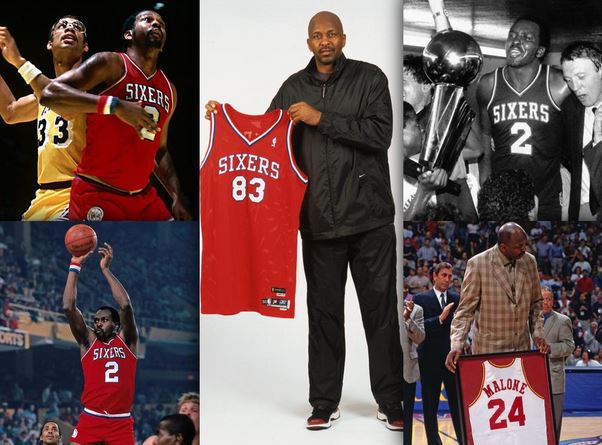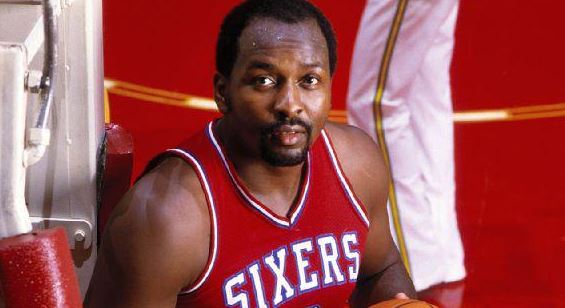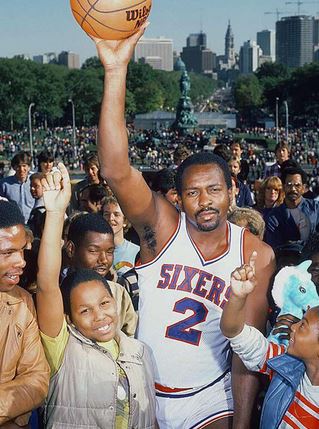 PHILADELPHIA — This cruel joke someone’s been playing on the Philadelphia 76ers these past few years–especially lately–has got to stop.
PHILADELPHIA — This cruel joke someone’s been playing on the Philadelphia 76ers these past few years–especially lately–has got to stop.
It’s one thing screwing around with the production on the court, resulting in just 71 victories over the past three years while the franchise has been stockpiling draft picks and injured big men. That’s rebuilding basketball, Sam Hinkie style.
But what’s happened off the court in the last year alone isn’t just heartbreaking, it is downright tragic.
One-by-one, Philadelphia’s most iconic big men have gone to that great center court in the sky, where the heavenly boxcore is now being tabulated by Harvey Pollack, who recently also became inscribed in the eternal scorebook of life at 93.
This coming Monday will mark a year since Caldwell Jones, the soft-spoken but hard-working big man who made the most of his ability in six years with the Sixers, left this earth at 64. Just three weeks ago, the hoops world was stunned to learn of the passing of his 58 year-old teammate, Darryl Dawkins, a behemoth in size who never lost his child’s sense of wonderment.
And now this.
Moses Malone, the man who took their place in 1983 after the franchise couldn’t quite get over the top, has sadly joined them. Only 60, the Promised Land has beckoned a player who made going to the rack—his term for rebounding–his mantra.
 Each loss hurts. This one, especially for someone who covered that 67-win team which thundered through the playoffs in just 13 games—one above the minimum—makes you feel your own mortality.
Each loss hurts. This one, especially for someone who covered that 67-win team which thundered through the playoffs in just 13 games—one above the minimum—makes you feel your own mortality.
After all, if Moses—who was so dominant, so relentless, so powerful—couldn’t prevent the inevitable, what hope is there for the rest of us?
By now you’ve undoubtedly heard the accolades streaming from all corners of the NBA and read the statistics. You’ve been told of the awards he received,the three MVPs—including the one from the 1983 Finals where Moses’ famed prophesy “Fo! Fo! Fo!” when asked for a postseason prediction, almost came true. And let’s not forget the 12 All-Star appearances.
But sheer numbers hardly tell the true story of Moses Malone, who once decreed he and any four guys from his hometown of Petersburg, Virginia, would be willing to take on anyone. And you would’ve been foolish to bet against him.
Back in Petersburg in 1974, young Moses was a legend whose exploits set the stage for another future great Virginian, Harrisonburg’s Ralph Sampson, to follow. Colleges lined up to recruit him, just as they had New York Power Memorial’s Lew Alcindor in the late 60s and, a few years later, a gangly Californian named Bill Walton.

Had he gone to college, Moses would’ve undoubtedly performed on their level. Instead, to the dismay of Maryland’s Lefty Driesell, he decided to skip school and turn pro, signing a five-year, $1 million deal with the Utah Stars of the ABA. Though thousands of miles from home, it didn’t take long for the big guy to make his presence felt, averaging 18.8 points and 14.6 rebounds that season, then 14.3 points and 9.6 boards in half a season with the St. Louis Spirits.
That proved to be the last gasp of the ABA, but only the beginning for Malone, who’d make his brief two-game NBA debut with the 1976 Buffalo Braves—who’d secured his rights from Portland for a first-round pick. He was then was promptly sent to the Houston Rockets for a pair of firsts, one of them eventually becoming Micheal Ray Richardson, and averaged 15.6 points and 15.4 rebounds for a team that would ironically fall to Philadelphia in the Eastern Conference Finals.
From there Moses was on his way, guiding Houston to the 1981 Finals, where they went down to the Larry Bird/ Kevin McHale/Robert Parish-led Celtics in six games. By this point, Malone had established himself among the preeminent big men in the game, right alongside Kareem Abdul-Jabbar, averaging at least 19.5 points—and usually a lot more—while pulling down double-figure rebounds.
Heading toward free agency and at his peak in 1983, the Sixers went all in, signing Malone to an offer sheet they were convinced the Rockets couldn’t—or wouldn’t —match. It never came down to that as Rockets instead accepted a pretty nice ransom to let him leave, the key being Philadelphia’s ’83 draft pick that would become Rodney McCray, along with the workmanlike Caldwell Jones, who would no longer be needed in Philly.
 Moses was billed as the missing piece in a Sixers’ championship puzzle that had come frustratingly close on several occasions—losing three times in the Finals. It was hardly false advertising, as the Sixers became a team on a mission, cruising to a 67-15 regular season that could’ve been even better had coach Billy Cunningham not rested his troops down the stretch.
Moses was billed as the missing piece in a Sixers’ championship puzzle that had come frustratingly close on several occasions—losing three times in the Finals. It was hardly false advertising, as the Sixers became a team on a mission, cruising to a 67-15 regular season that could’ve been even better had coach Billy Cunningham not rested his troops down the stretch.
That left them with plenty of gas in the tank for the playoffs—not that they needed it—disposing of the Knicks in a four-game sweep, taking out the Bucks in five before avenging years of frustration with a four-game sweep of the Lakers. And while The Doctor, Julius Erving, sixth man Bobby Jones, quietly efficient point guard Maurice Cheeks and explosive shooting guard Andrew Toney surely did their parts, the difference was Moses.
At least on the court. Off the court, though, you’d never hear Moses ranking himself among one of the game’s elite.
While never rude, Malone was never what you’d call a “good sound bite” He had a deep voice and an infectious laugh, but rarely let that side show in public. With Moses it was all about the work. He’d be happy if you shined the spotlight in every direction but his.
His famous “Fo. Fo. Fo.” quote was a perfect example. He wasn’t trying to call attention to himself, predicting the Sixers would sweep their way through. He was just answering the question in his own inimitable way.
That never changed in his four years in Philly—which ended ingloriously when he was traded to the Bullets prior to the ’86 draft, along with forward Terry Catledge, and two first-round picks for brutish center Jeff Ruland and offensive minded forward Cliff Robinson. While that deal—along with a subsequent trade in which Philadelphia moved the No. 1 pick in the ’86 draft (Brad Daugherty) to Cleveland for power forward Roy Hinson—backfired completely, Malone didn’t hold any grudges against the organization for long.
Since leaving the rack to others, following a 21-year Hall of Fame career that saw him average 20.2 points and 12.2 rebounds, Malone became a part of the Sixer family. They’d trot him out frequently for team functions or to commemorate that 1983 championship—the last one this franchise has earned—and Moses seemed to enjoy it. He also enjoyed getting to work with the big men on occasion, although it had to drive him mad nobody had the work ethic and drive that made him special.
But you’d never hear Moses complain. You’d hear him laugh and see that sparkle in his eyes as he’d tell stories of what it was like to play the game back then; to play alongside Doc and Mo and Bobby and Andrew. As a wise man once said, “it’s not bragging if it’s the truth.”
The truth is Moses Malone wasn’t the most talented or most athletic. But he might’ve been the most determined. That’s why he and four guys from Petersburg would’ve taken on the world.
Sadly, now he’s choosing from a different pickup squad, although there’s plenty of legendary company. And don’t be surprised if Caldwell Jones and Darryl Dawkins are playing for the other team.
Maybe for special occasions he’ll even get to go against arguably the best of all time—with apologies to Bill Russell and even Michael Jordan. Just imagine Moses taking on Wilt Chamberlain, who’s been doing Dipper Dunks up there since 1999.
Down here though it will be a little more lonely with all of them gone. Especially when the Sixers celebrate their past, which is certainly more noteworthy than their present. So many greats gone too soon.
Just how many punches to the gut is a franchise supposed to take?
But if they’re anything like Moses Malone they’ll just keep going to rack time after time until the ball finally goes through the hoop. That would be only fitting.
And the perfect way for this cruel joke someone been playing on them and us to finally stop
(RELATED: FOND FAREWELL TO AN NBA LEGEND, DARRYL DAWKINS)
Jon Marks has covered the Philadelphia 76ers from the days of Dr. J and his teammate, Joe Bryant (best known as Kobe’s dad). He has won awards from the Pro Basketball Writers Association and North Jersey Press Club. His other claim to fame is driving Rick Mahorn to a playoff game after missing the team bus. Follow him on Twitter.